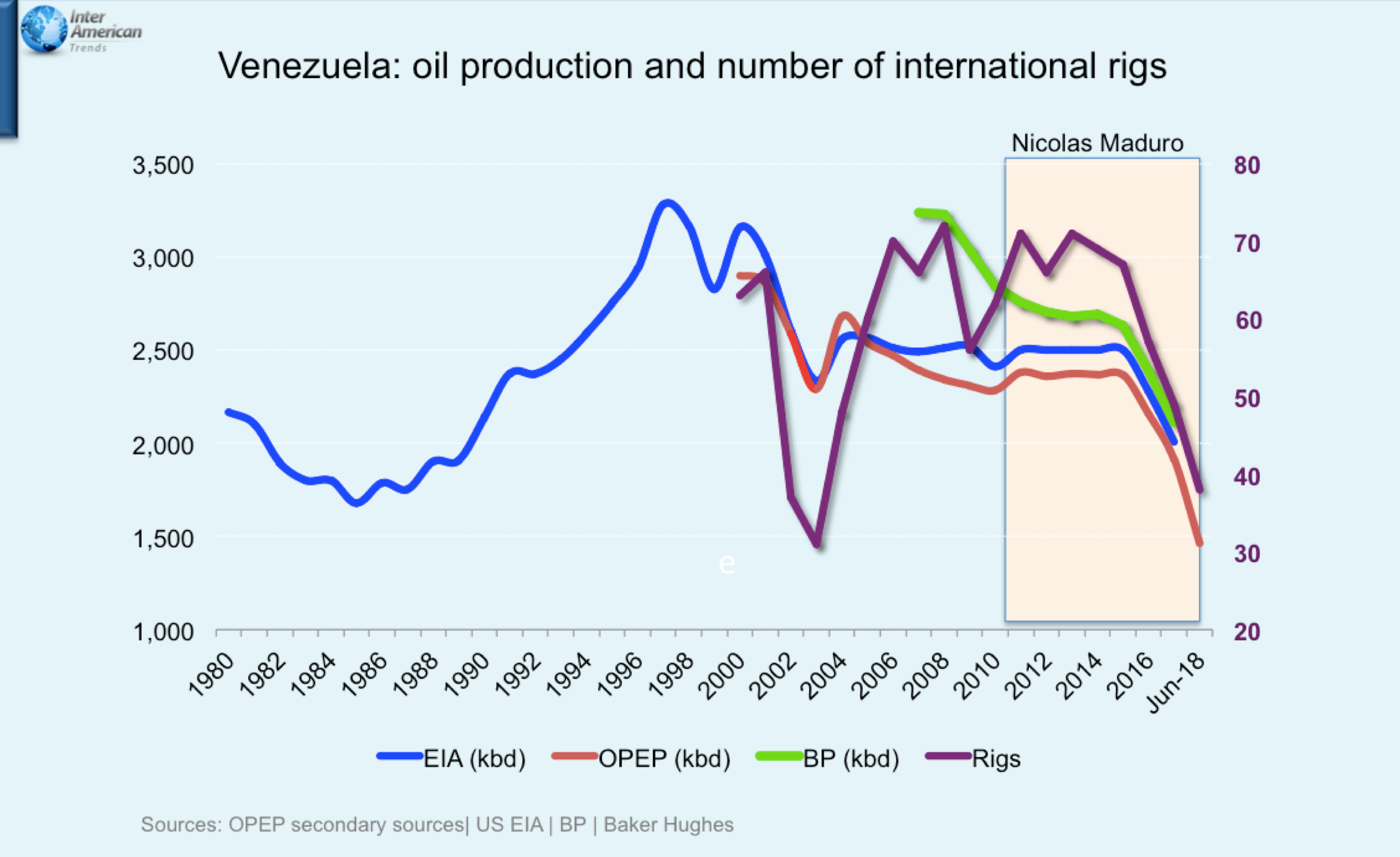





|
Tweet
|
|
|
Nicolás Maduro continues telling tales to the Venezuelans. This time, on August 28, he said that "the production of 14 oil fields will increase by 641 thousand barrels per day", after signing 14 special agreements of joint services. Maduro also said that the investment for this rise in barrels would be 430 million dollars. For this purpose, he called 7 service companies (Well Services Cavallino, Petro Karina, Helios Petroleum Services, Shandong Kerui Group, Rinaca Centauro Karina Consortium, Tomoporo Oil Consortium and Venenca) that will seek the improvement of the current oil production (384 thousand barrels per day) in the Arecuna, Sanvi Guere, Orocual, Dacion, Jusepin, Franquera-Tomoporo and Carito-Pirital fields. Two years ago, on November 2016, the tale was about the financing of 10.7 billion dollars provided by partners in the mixed companies to increase oil production in 855 thousand barrels per day - Sinovensa 4 billion dollars, Petroboscán 2 billion dollars, Petrodelta 1.13 billion dollars, Petrozamora 1 billion dollars, Petroquiriquire 1.2 billion dollars, Petrocabimas 625 million dollars, Petrowarao 420 million dollars, and Petrolera Indovenezolana 318 million dollars. Last year, on September 2017, the narrative was that with two of the largest oilfield services companies in the world, the French Schlumberger and the American Halliburton, they would achieve a rise in production of between 200,000 and 300,000 barrels per day in light and medium crude oil production. It would have been done in northern Monagas and the Zulia state, with the rehabilitation of 800 wells. Also, the services of both transnationals would be paid with the increase in t production, i.e., in kind. The results of these tales are in sight. According to secondary sources of the Organization of Petroleum Exporting Countries (OPEC), Venezuela's oil production fell 208,000 barrels per day on yearly average in 2016 and 246,000 in 2017, adding to a total collapse of 454,000 barrels per day. Furthermore, in the first six months of this year, the drop in crude oil pumping is equivalent to the cumulative fall of the previous two years, 448,000 barrels per day. The stories of Maduro-del Pino of 2016, Maduro-Martínez 2017 and now of Maduro-Quevedo contrast with reality. The statistical analysis of the Venezuelan oil production series recorded by secondary sources from OPEC, the United States Energy Information Administration (EIA) and the British Petroleum (BP) oil company, shows a very high positive correlation between Oil production and drilling activity carried out by international well-service companies. For the 2011-2017 period, the value varies between 0.966 for the EIA series and 0.978 for the OPEC and BP series. For the period of Nicolas Maduro, 2013-2017, the ratio between the two variables is closer to 1, ranges between 0,979 for the OPEC and EIA data, and 0,991 in the case of BP, which indicates a perfect linear relationship. These findings make it possible to ensure that initiatives to increase oil production in Venezuela in 2016, 2017 and so far in 2018 have been unsuccessful. Also, Venezuela has not had a significant increase in oil production during the last 14 years. The increase observed in 2004 was the result of the industry restarting operations after the oil strike in 2002-2003. Only in the stage of the opening of Venezuela's oil industry in 1996, Venezuela increased the volume of oil pumping by more than 300 thousand barrels per day. Both occasions were in 1997 and 2000. In each of Maduro's stories, the actors (companies) change although the plot is similar: "PDVSA subscribed agreements/financing to increase production". Besides, Maduro always swears "to God and my mother" that "the companies have all the legal security, all the investment facilities that will be recognized by PDVSA". An example of "swearing in vain" was the experience of Halliburton and Schlumberger that included their operations in Venezuela as a loss in their financial statements for the fourth quarter of 2017, to avoid showing unfavorable results to their shareholders. In the case of Halliburton, the book losses were 938 million dollars, divided in 469 million dollars from accounts receivable, 105 million dollars related to the payment of promissory notes, 285 million dollars from fixed assets and 79 million dollars from other assets. Oil production in Venezuela will continue in free fall this year. Maduro's tale will come back in 2019. On this occasion with another puppet as CEO of PDVSA, because in each story Maduro swallows the marionette who is in charge of the oil industry. The new plot will be the delivery of oil fields to the partners of the mixed companies, violating the legal framework of 2006. Therefore, every time that Maduro comes with the tale of oil production surge in Venezuela, he brings to mind a never-ending story. |

